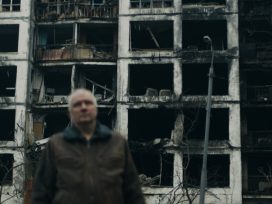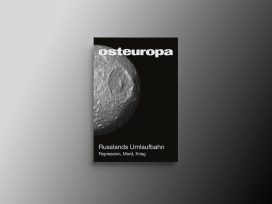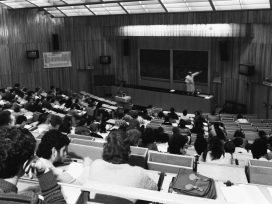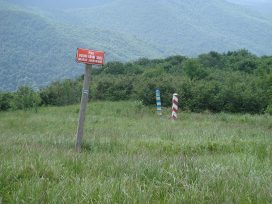The reality of war
Ukrainians should have known that war would be the ultimate consequence of their identification with the West. Now that Russia has carried out its longstanding threat, the reality has dawned. But can the same be said for Europe?
War is both a tragedy and a challenge for the inhabitants of a country experiencing aggression. Ordinary life is ruined. Tough decisions must be made: to remain at home or to leave, and if you leave, where do you go – to other regions of the country or abroad? Every day brings new trials and difficulties. You enter the world of the news that, until recently, was somewhere at the edge of your awareness.
For a writer, war is a choice of remarkable subjects that peaceful life, fortunately, does not offer: examples of self-sacrifice, heroism and solidarity, as well as betrayal, cowardice and wickedness. There are so many of these subjects that one cannot muster enough creative force and find time to deal with them. It is no accident that the best books about war appear, as a rule, after a war ends. It is not by chance that the classic books about war present not pathos but experiences, the destinies of people in a world that will never be pre-war again.
For a journalist, war is work. In this sense, a journalist’s work is more akin to that of a soldier or a doctor. Choosing this profession – if it is a conscious choice, of course – is also deciding on an extreme situation. Therefore, I believe that everything changed for the country, but not for my colleagues or me. We are trying to do what we were doing before the war: reporting the news, speaking with people, and attempting to analyse the situation. This is an ordinary performance of professional duties, which takes place in complex conditions. But the conditions for journalism are not something to be chosen. Besides, the more dramatic and extreme the situation, the more opportunities for our professional activities. It is no accident that, now that Ukraine is continually the top story worldwide, film crews from major international media outlets are in our country; the most famous journalists and photographers are flocking there, and stunningly powerful stories are being created. Ukraine interests everyone. And we are already here, at the centre of these events.
I won’t say that this gives me any great joy. Being front-page news material means that the war is still going on; a missile has struck a maternity hospital; my fellow countrymen have been killed; someone is without electricity and heating once again. I would like Ukraine to be mentioned for other reasons, say, its accession to the European Union or NATO. or some scientific or cultural achievements. Our life, rather than death, would thus be in focus. But for this to happen, we must first go through the war and win it.
In the whirlwind of my journalistic activities during these difficult months, I lost the most important thing: my work as a political analyst. It is practically impossible to analyse the war, even though the demand for analysis has skyrocketed. Every day, I encounter people who ask me when everything will end and when we will win. I am reluctant to offer any specific predictions – in contrast to politicians, who exist to offer hope to their potential voters, and information charlatans, who sell hope on social media, frequently even brandishing their ‘unofficial’ status as government representatives. Instead, I try to explain that the only thing a person can do amidst a military conflict is to learn how to live with it. Of course, we all want the war to end as quickly as possible. But the definition of war is that two sides take part in it and that as a rule, their wills are diametrically opposed.
During the first days of the Russian attack, the Kremlin was keen for the war to end as soon as possible. Vladimir Putin was counting on a blitzkrieg and calculating that Viktor Yanukovych’s puppet government would be installed in Kyiv literally a few days after the invasion. He planned for ‘referendums’ on joining the Russian Federation to take place in most of Ukraine. The territory which Putin would decide to leave to his marionettes was to become part of the ‘allied state’. He wanted to hold a parade of Russian troops in occupied Kyiv – it is no accident that Putin’s soldiers were issued a parade uniform shortly before the invasion.
But we were interested in preventing this blitzkrieg, continuing military operations, and expelling the Russians from our land.
Now, over a year after the start of the war, the situation seems to be the complete opposite. After the successes of the Ukrainian troops, which drove the Russians out of Kharkiv oblast in the north and the city of Kherson in the south, we want all Russian-occupied territory of our country to be liberated as quickly as possible and the war to end. But Putin has his own goals. His ideas about the war were completely reformatted after the failure of the blitzkrieg. The Russian president is now set to continue the war – as a war of attrition. He is convinced that if the war lasts several difficult years, Ukraine will have to capitulate sooner or later, and that the West will have to stop supporting Kyiv.
There is more fanaticism in this conviction than sober calculation. But fanaticism in wars is also very important, as is dedication. Putin clearly did not expect such self-dedication on the part of the Ukrainians. He could not imagine that even ten months into the war, after all those Russian atrocities, destruction and attacks on Ukraine’s critical infrastructure, the citizens of Ukraine would continue to be convinced of the necessity to liberate all their occupied territory. When an aggressor’s fanaticism comes up against a victim’s dedication, the aggressor is usually doomed to defeat. But when and how this defeat will take place, no one knows.
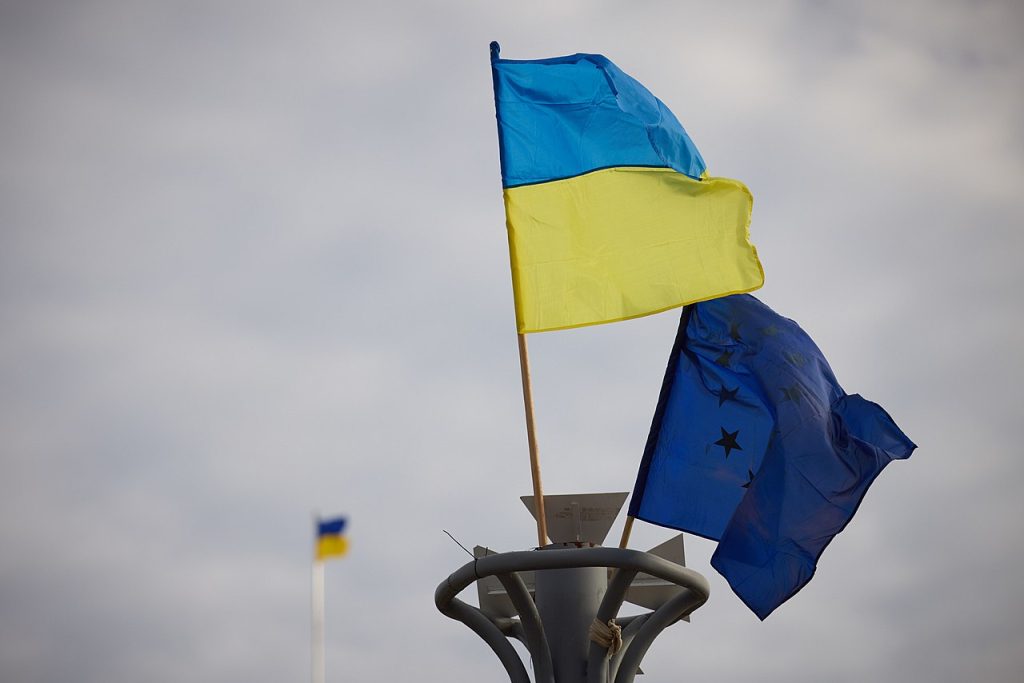
The Ukrainian and EU flags flying in de-occupied Kherson. Image: President Of Ukraine. Source: Wikimedia Commons
An invasion in the making
A special feature – and shortcoming – of my creative method and my very perception of life is the longing to remember the past and analyse the future, but not to get hung up on the present. Since my childhood, I have envied people who know how to live in the present and are certain that life is in the fleeting moment. But life is, in fact, what was and what will be. And if there will be nothing, then there is no life itself – no fleeting moment.
When I think about these past decades, I am always surprised at how frivolous and naive my compatriots were. Our western neighbours almost instantly began to build states with guaranteed security. Membership in NATO and the European Union became the goal of nearly all the central European countries. Meanwhile, for two decades now, Russia has been building a state that is supposed to correct the ‘mistake of 1991’ and again to gather into one country the territories that were once part of the imperial state and the Soviet Union.
Where fundamental questions are concerned, there is a remarkable consensus in central Europe and Russia. The majority of citizens in Poland or Romania supported European and NATO integration. Most Russians, as we learned in 2014, support Putin’s aggressive actions –we can say with certainty that, with his aspirations to occupy and annex Ukrainian territories, Putin speaks in the name of the population of his country.
What was happening in our country during these decades? First, there was a permanent identity conflict. During elections and in civic life, Ukrainians who felt they were citizens of a sovereign European country opposed countrymen who still perceived Ukraine as a continuation of the Ukrainian SSR and a part of the ‘Russian world’. Both camps constantly appealed to those who were absolutely indifferent to which country they lived in, as elections could not be won without them.
Gaining the favour of this electoral segment was possible only by proffering unattainable populist promises. Thus, no single strategy for the country’s development was fully implemented over three decades. Pro-Ukrainian forces came to power only as a result of popular uprisings, which were a response to the aspirations of pro-Russian forces to get too close to Moscow. This truly vicious circle was seemingly broken in 2019, when the majority voted for a dream – each for their own – and at the same time, in favour of underestimating the risk connected with Russia’s aggressive actions.
There is a long history to this underestimation of risk.
Russia is not the tsarist Russia that existed until February 1917 and not the Soviet Russia that occupied the Ukrainian lands after the Bolsheviks’ fleeting war against the supporters of Ukrainian independence. It is the Yeltsinite Russia, which never concealed its ambitions and demands. Right after Ukraine proclaimed its independence, Pavel Voshchanov, Boris Yeltsin’s press secretary, issued a statement in the name of the president:
The Russian Federation does not call into question the constitutional right of every state and people to self-determination. However, there is a problem with the borders, the unresolved nature of which is feasible and acceptable only if there are allied relations enshrined in the relevant treaty. In the event that it is terminated, the RSFSR reserves the right to revise its borders.
In May 1992, the Supreme Soviet of the Russian Federation issued an official statement declaring that the legislative acts transferring the Crimean oblast to Ukraine had no legal force at the time of their adoption. In July 1993, the Supreme Soviet of the Russian Federation approved a decision concerning Sevastopol. That day the atmosphere in the Russian parliament was no different from what we are seeing today in the State Duma. As I observed this atmosphere of hatred, I became fully convinced that war between our two countries was inevitable. At this juncture, the Russian parliament instructed the Supreme Soviet Committee on Constitutional Legislation to draft a federal law consolidating the federal status of Sevastopol in the Constitution of the Russian Federation.
At a meeting in Lipetsk several days before this parliamentary decision, Yeltsin himself spoke about ‘Russian Sevastopol’, thereby disavowing the resolution of the Supreme Soviet of the Russian Federation in the logic of his permanent conflict with parliament. Putin would, in turn, implement this directive two decades later.
Why did Russia not attack back then? Because it did not have the forces? Because Yeltsin, the politician, was far more of a realist than Putin? While this was undoubtedly a significant factor, the main reason was the ‘frozen mode’ in operation throughout Putin’s first decade and even during Yeltsin’s rule.
Russian politicians viewed Ukraine and the other former Soviet republics as failed or failing states that, sooner or later, would join a new Union state or Russia itself. But they were in no rush for one simple reason. Moscow perceived the elites and the population of the former Soviet republics as behind the times, backward and provincial. They considered it crucial first to implement reforms and divide up property, and then, once Russia became stronger, ‘to resolve the territorial question’. A simple rule was at work here. The former Soviet republics (the Baltic countries being an exception, as was noted in Voshchanov’s statement from August 1991) were not supposed to join international organizations that would guarantee the security of such republics.
Simply put, neither Ukraine nor any other former Soviet republic could join NATO and the European Union. Whereas in the past, some viewed this idea as a fabrication (even though I had often heard this formula expressed by high-ranking Russian officials), now it is clearly put forward in proposals concerning Russia’s security, which the Russian media reported shortly after the attack on Ukraine. If any inclinations toward membership appeared, Russia was to block them by any means.
In the 1990s, and especially after Leonid Kuchma’s victory in the presidential election, there was simply no need for an intervention in Ukraine. Kuchma was the creator of oligarchical Ukraine. His term in office is remembered nostalgically by most of my fellow countrymen, but he was precisely the ‘president of the frozen mode’. The Russian leadership, now with Putin at the helm, wanted Kuchma to handover power to his protégé, Viktor Yanukovych. At that time, Viktor Medvedchuk held the leading position in the presidential administration. Yanukovych was then supposed to carry out the program of ‘integration.’
The first Maidan wrecked Moscow’s plans. But the number of citizens who voted for Yanukovych, even in the runoff elections, convinced the Kremlin of the possibility of revenge. This took place in 2010. But before that, Russia blocked the NATO Membership Action Plan to Ukraine and Georgia. The Yanukovych administration oversaw a degradation not only of our ‘semi-Soviet’ statehood but also of our law enforcement agencies. Ukraine was saved only by the puppet president’s greed and shortsightedness: Yanukovych tried to get money from literally everyone, which is why his administration continued to work on the Association Agreement with the European Union.
The decision not to sign this agreement because of Putin’s personal pressure was the last day of the real rule of pro-Russian forces in Ukraine. The victory of the second Maidan alarmed Putin because, this time, he saw neither potential for revenge nor the possibility to disrupt the signing of Ukraine’s Association Agreement with the EU. The decision was then made to transform the neighbouring country into a ‘disabled state’ like Georgia or Moldova. And even though the plan to occupy significant swathes of territory in the east and south of Ukraine failed, the Kremlin succeeded in establishing control over the Crimea and parts of Donetsk and Luhansk oblasts.
They may have thought in Moscow that this was enough to block any possibility for Ukraine’s European and NATO integration and pave the way for the collapse of the national democrats, whom they called the ‘party of war’ and blamed for Maidan’s victory and Yanukovych’s defeat.
The next disappointment came in 2019. Zelensky’s election was perceived in Russia as the harbinger of Ukraine’s imminent capitulation, but though ready to talk, the new Ukrainian president would not capitulate. But in Moscow, they did not want to talk about anything else. Finally, in 2020, there was a change of power in the United States. The new American president declared that the occupation of the Crimea and the Donbas should not prevent Ukraine from joining NATO if Ukraine satisfied all the membership criteria.
This phrase hit me – and doubtless not just me – like a powerful bell toll. In the Kremlin, it would have been perceived as proof that the ‘disabled state’ formula was no longer working and that the only alternative to stopping Ukraine from ‘leaving’ was to occupy it. For me, the clock was now ticking. But Ukrainians absolutely ignored Biden’s words, instead reacting with mockery to the overt threats expressed in the articles written by Putin and his devoted associate, Dmitry Medvedev. ‘Look at those ignoramuses. They have a poor grasp of history. Let them play around with their historical research. In our country, we are doing real stuff; we are building roads.’
During all these decades, I was living in a state of professional despair. On the eve of war, Ukraine could be the subject of a satirical film called Don’t Look Up! Ukrainians were refusing to look up, and when they did, they didn’t see anything: no Russian threats, no energy blackmail and no Tuzla incident. Not even the invasion of the Crimea and the eastern part of the country led to fundamental changes in how the majority of the population perceived reality.
This could be understandable among the older generation or my peers, who were born in the Soviet Union. But after I met with students in several Ukrainian cities after 2014, I saw how illusory the world perception was of many of those who will be building our country in the next few decades. The future was determined; the comet was already on its set trajectory, but the protagonists, as usual, were preparing for a show or, in the case of Ukraine, for kebabs. [In an effort to reassure citizens, Zelensky released an address on 19 January 2022 assuring them that they would be, as usual, making kebabs in May. – ed.]. Most people, including members of the political elite and especially representatives of the government formed after the 2019 elections, adamantly refused – and often refuse even today – to understand the reasons that led to Russia’s attack on Ukraine, as well as the reasons why most Russian citizens support this aggression.
The return of the future
After 24 February 2022, we are all finally living in reality rather than a utopia. Of course, it is a terrible reality, but only this reality allows us to hope that we have a future. There is no future a priori in a utopia.
Today, what interests me above all is how the ‘reverse formula’, which should forever ruin Russian ambitions and prevent the restoration of the empire, will work. In very straightforward terms, after the liberation of its territories and the conclusion of the war, Ukraine must become a member of NATO and the European Union. Otherwise, our country is doomed to be a territory of new bloody battles and a buffer zone in a civilizational conflict.
I am really hoping for wisdom – not from our fellow citizens, but from the civilized world. Ukraine’s integration is the only path to European security. Any other path will lead us to the Third World War. Of course, I am very interested in knowing how many Ukrainians will be able to continue living in reality once the war ends. This will be the reality of a difficult peace and complex state-building rather than war. If the majority of Ukraine’s citizens prefer a utopia all over again, we may remain a marginal, poor country on the sidelines of Europe – a country dwelling on the memory of the war rather than in the successes of peaceful development.
I really do not want this. I dream – and this is no utopia but reality – about a happy, democratic Ukraine that will strengthen, rather than weaken, Europe. I dream about a powerful and comfortable country where people will speak Ukrainian at home, on the streets, and in temples and theatres. A country where experts are respected, while populists and rogues are not, no matter what kind of carnival costumes they don to cover their nakedness. I know that we can build such a country. I believe that we deserve such a country.
The ‘War Is… Ukrainian Writers on Living Through Catastrophe’ essay project is created with the support of Ukrainian Jewish Encounter (UJE), a Canadian charitable non-profit organization.
Published 8 May 2023
Original in Ukrainian
Translated by
Marta D. Olynyk
First published by Krytyka 1–2/2023
Contributed by Krytyka © Vitaly Portnikov / Krytyka
PDF/PRINTPublished in
In collaboration with
In focal points
Newsletter
Subscribe to know what’s worth thinking about.
Related Articles
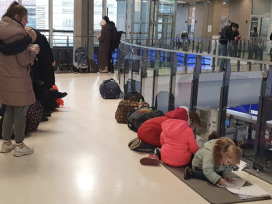
'It’s important to be open'
A Knowledgeable Youth podcast
Remaining in a new country or returning home? The Knowledgeable Youth podcast delves into the complex decision-making refugees face when migrating, together with researcher Olena Yermakova.
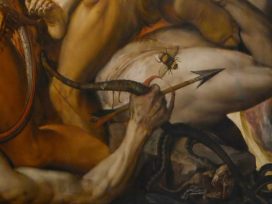
The difference between knowing from distance that war is being waged and living that reality couldn’t be more extreme. But can awareness of multiple repercussions turn protective disassociation from violence into active solidarity? ‘The Most Documented War’ symposium in Lviv, Ukraine, provides valuable pointers regarding engagement and responsibility.

